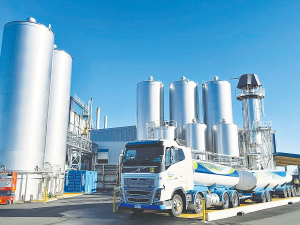Another Windfall for Fonterra Farmers, Unit Holders
Fonterra farmer shareholders and unit holders are in line for another payment in April.
 Fonterra has invested $40 million at its Tirau site to help concentrate whey permeate, making it more efficient to transport to its other sites to produce lactose.
Fonterra has invested $40 million at its Tirau site to help concentrate whey permeate, making it more efficient to transport to its other sites to produce lactose.
Fonterra is eyeing an increase in lactose production.
The co-operative has just invested $40 million in a move to help concentrate whey permeate at its Tirau site to make it more efficient to transport to other sites to produce lactose.
It’s a move the co-operative says is a positive step forward, creating better value return than the ethanol produced previously at the Tirau site.
During the dairy season’s peak, the plant produces up to 2 million litres of milk each day.
According to Fonterra general manager Central North Island Tony Maclean, 2.5 million litres of ethanol is also potentially stored there, meaning the plant is designated as a major hazard facility.
Maclean says that when the Tirau plant was built, there were benefits to converting lactose into ethanol.
“When the plant was built, the benefit of generating ethanol was primarily… set up reduce the amount of lactose that went to a wastewater treatment plant,” he told Dairy News.
Maclean says that at that time, harvesting the lactose as ethanol was seen as better than sending it on to wastewater treatment ponds.
He says that now, however, lactose produces more earnings for the cooperative than ethanol.
“Ethanol has limited usage. I mean, they made industrial grade ethanol there which was made for things like solvents and sanitisers where lactose can be used in a whole raft of pharmaceutical applications.
“The profitability from lactose as a product was greater than ethanol was.”
Maclean says the investment also means a lot for the co-operative in terms of its sustainability goals.
“We have a massive energy production per year,” Maclean told Dairy News, adding that energy production totalled 15,000 megajoules per year.
He says the move away from ethanol production towards lactose production will see reductions in CO2, water usage, wastewater and general waste. “So, it’s some pretty impressive numbers around those reductions.”
Maclean says there’s great value for money in the move as well.
“If you look at spending our shareholders’ money on remediating an asset to be compliant, around making that redundant and investing money into a brand new asset, with a slightly different product mix… the savings from that as well as the ability to generate lactose, we have the ability to reduce energy, reduce carbon, reduce water, reduce wastewater and waste,” he says.
The Meat Industry Association of New Zealand (MIA) today announced that Chief Executive Officer Sirma Karapeeva has resigned from the role.
The winners of the 2026 Hawke’s Bay/Wairarapa Dairy Industry Awards were announced at the annual awards dinner held at Copthorne Solway Park in Masterton on Thursday evening.
Environment Southland is welcoming this week’s decision by the Environmental Protection Authority (EPA) to approve the release of Blaptea elguetai, a leaf‑feeding beetle that will help control the highly invasive Chilean flame creeper.
This March, the potato industry is proudly celebrating International Women’s Day on 8 March alongside the International Year of the Woman Farmer, recognising the vital role women play across every part of the sector — from paddocks and packhouses to research, leadership, and innovation.
Fruit trader Seeka posted a record profit and returns to shareholders in 2025.
Recent weather events in the Bay of Plenty, Gisborne/Tairawhiti, and Canterbury have been declared a medium-scale adverse event.
OPINION: Staying with politics, with less than nine months to go before the general elections, there’s confusion in the Labour…
OPINION: Winston Peters' tirade against the free trade deal stitched with India may not be all political posturing by the…